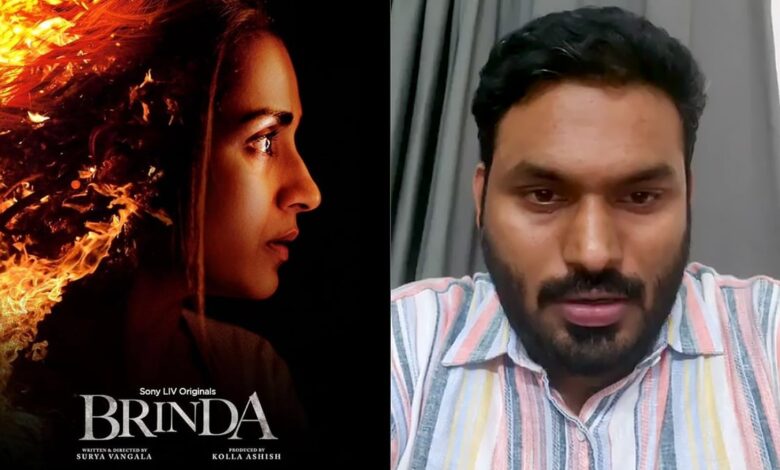Telugu Thriller Brinda’s Director Surya Manoj Vangala Opens Up About the Series, Religious Extremism, and More

It has become rather rare for the Indian television industry to produce a crime thriller that isn’t a botched-up compilation of predictable plots, theatrical dialogues, and unnecessarily dramatic background scores. Thankfully, SonyLiv’s original web series Brinda is wary of these shortcomings and offers a refreshing take on the genre that keeps you invested throughout. The eight-part series is the brainchild of debut director, Surya Manoj Vangala, who has spent over a decade ruminating over the concept.
In a thought-provoking conversation with Gadgets360, Surya shares the inspiration behind the show, the emotionally taxing research it took, the intended audience, his views on extremism, and more.
Inspiration Behind Brinda and Personal Connection
![]()
There are questions inside my head that I have put in Brinda’s story: Vangala
Photo Credit: Surya Vangala Instagram
Brinda starts as a simple murder mystery that piques the curiosity of an otherwise reserved police officer named Brinda (Trisha Krishnan). As the determined officer decides to dig deeper into the matter, against the approval of her seniors, a horrifying web of faith, violence, superstitions, and more is uncovered. We see six-year-olds being set on fire, communal human sacrifices and mob lynching, among other extremist actions.
While the show may be a work of fiction, it draws heavily from real life. All the horrifying incidents shown can be traced back to true incidents, as per Vangala. The director says that extremism exists on both sides of the spectrum, as shown in the series.
“For some people just saying the name of God is extremism, and then there are some who are extremely religious and don’t have tolerance for the other side.”
As per him, even though both sides “make sense to some extent,” extremity of any sort can be dangerous. However, with so much noise from both ends, it can be rather daunting to find your own stance: “Where do you find yourself?”
Vangala says that this question has been ringing with him for decades and this internal crisis is precisely what drove him to create Brinda. Just like the protagonists, Vangala found himself questioning the existence of God, the necessity of imposing superstitions to the extent of defying humanity, and the violent rebellions of those who despise everything religious. “There are questions inside my head that I have put in Brinda’s story,” he says.
The Emotionally Taxing Research for Brinda
![]()
It is not about the extremes in society but the good in you that you have to pamper: Vangala
Photo Credit: Shakthi Kanth Instagram
Brinda is full of controversial dialogues, theories, and disturbing scenes. With ban culture and intolerance at their peak, it is even more important for the entertainment industry to back its work with facts.
While Vangala admits that he hasn’t witnessed or experienced extreme ceremonies like human sacrifices himself, he has researched enough to be able to “trace down” such bone-chilling practices, that exist even in modern times. The director said that the eight-part series was based on nearly a decade’s worth of extensive research with many interviews, discussions, round table sessions, and workshops in place.
He recalls a particularly terrifying incident that he learnt of while researching for the show, where a young girl within a religious institution was put into a dog kennel when she started menstruating. Vangala has depicted a similar instance of inhuman cruelty in Brinda.
The first-time director further reveals that the research for Brinda has been emotionally taxing, given that the team encountered several similarly tragic incidents, stemming from both religious and anti-religion extremism, along the way.
“It has been so heavy on my heart that I was telling myself that I should do a comedy next,” he jokingly says while sharing that researching the show took a toll on him. As darker truths kept emerging, Vangala says he found himself leaning more towards pessimism, spiralling towards mental crisis.
“Luckily, like Brinda, I discovered what I should stick to. It is not about the extremes in society but the good in you that you have to pamper. You must tell yourselves that you have to hold on to the goodness inside you and everything will be okay.”
Multi-Layered Characters and Fictional Bird in Brinda
![]()
I watch lots of murder mysteries: Vangala
Photo Credit: Surya Vangala Instagram
Vangala tells us that all characters, including the ones with smaller roles, in the series, are richly layered and have a multi-dimensional arc. Speaking of one of the main villains in the show, he says: “He is not just a random villain; he was put to extreme religion”. He further elaborates that all negative characters have been written so that the audience won’t hate them.
Another important character in Brinda is a psychology professor, who occasionally gives away a theory or two. When asked if Vangala had a consulting psychologist or psychiatrist on board, the director gave a reassuring nod that the screenplay had been finalised after ample discussions with subject experts and references from the literature. He further agrees that shows that dealing with sensitive subjects like Brinda might leave a much deeper impact on viewers, making it even more important for creators to cross-check the facts and theories presented by the characters.
Vangala, however, has taken creative liberties as well. He excitedly tells us about the flesh-eating bird shown in Brinda, that leaves peculiar wounds on the bodies of its victims. It’s a vicious prey-bird that flows over the Himalayas and is important in human sacrifice culture in some places.
“I came up with the [fake scientific] name myself. I wanted it to be unique. I wanted to give her a fictional story and merge it with mythology,” Vangala tells us with a beaming sense of pride. “The bird has a story of its own!” While he wouldn’t confirm if a second season is on the cards, he claims that if there is one, the director would like to show more of the bloodthirsty avian. Vangala jokingly suggests that the bird can easily have its own show in the “Brinda franchise,” just like Joker from the Batman universe later got his fair share of fandom in cinema and television.
Where Philosophy Meets Genre
![]()
Team Brinda had superb technicians: Vangala
Photo Credit: Surya Vangala Instagram
Speaking of his writing process, Vangala tells us that he wanted the screenplay to invest the viewers in the mystery around the murders in a way that they are naturally drawn towards the philosophical questions he wants them to explore.
Since the director also wanted to avoid a preachy tone, a murder mystery seemed the perfect way to keep the audience engaged and subtly nudged towards the retrospection he wanted.
“[When] you see who is doing it [murders] since the beginning, then why becomes a question. Till then you’re already hooked onto details like what happened to him, [or] why is he the way he is. Generally, people dumb down the audience, but I didn’t want that. I wanted to make them think about the why,” he says.
However, Brinda isn’t just a show that explores religious or anti-religion extremism. “Even if people aren’t interested in the theme, the show has plenty of other elements to keep them engaged,” Vangala says, highlighting the show’s technical aspects, character relationships and music. “Genre comes secondary to what I want to tell with the story,” he adds.
With a team of experienced technicians who have worked on some of the biggest films in South India, Vangala is confident that Brinda will deliver a cinematic experience that will resonate with audiences. “Despite how much we want to write and convey the philosophy, it is the cinema that the audience is coming to watch. And you have to give them that experience.”




